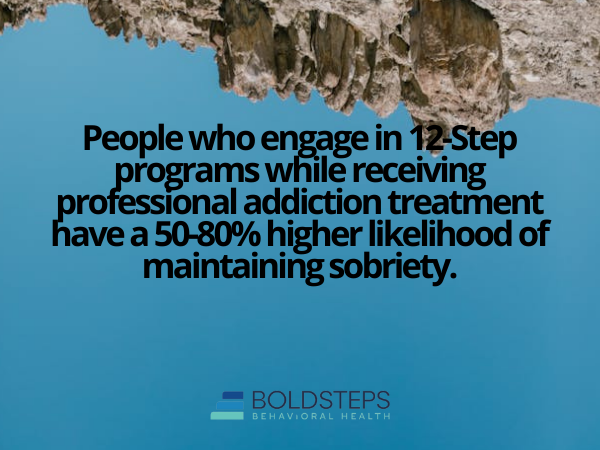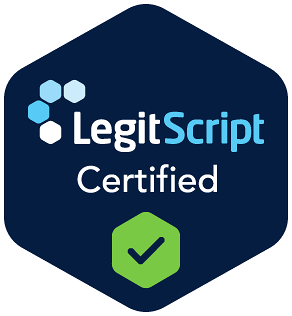For decades, 12-Step programs have served as a cornerstone of addiction recovery, offering structure, peer support, and a sense of community. While Alcoholics Anonymous (AA) and Narcotics Anonymous (NA) are the most well-known, there are numerous other 12-Step fellowships designed to address a wide range of addictions—including substance use, behavioral addictions, and emotional struggles.
At Bold Steps New Hampshire, we believe that recovery is personal—what works for one person may not work for another. That’s why we provide comprehensive, individualized care, including Addiction Treatment Programs, Dual Diagnosis Treatment Programs, Partial Hospitalization Programs, Intensive Outpatient Programs, Outpatient Treatment Programs, Medical Detox Programs, and Virtual Treatment Programs. These programs work hand-in-hand with 12-Step groups to provide a well-rounded recovery journey.
Whether you’re in early recovery or have been sober for years, finding the right 12-Step program can be a powerful tool in maintaining long-term sobriety. This guide explores lesser-known 12-Step groups that offer specialized support for various forms of addiction and emotional healing.
How 12-Step Programs Support Long-Term Recovery
12-Step programs provide accountability, fellowship, and personal growth, following a structured framework that includes:
- Admitting powerlessness over addiction.
- Seeking help from a higher power (as defined by each individual).
- Making amends and repairing relationships.
- Committing to self-improvement and helping others in recovery.
Studies show that participation in 12-Step groups significantly improves sobriety rates. According to the National Institute on Drug Abuse (NIDA):
- Those who engage in 12-Step programs while receiving professional treatment have a higher success rate in maintaining sobriety than those who attempt recovery alone.
- Active participation in 12-Step fellowships is associated with a 20-50% decrease in relapse rates.
- Sponsorship and group accountability increase long-term recovery success.
12-Step Groups for Substance Use Disorders
While Alcoholics Anonymous (AA) and Narcotics Anonymous (NA) are the most recognized 12-Step groups, several others cater to specific substance use disorders.
1. Cocaine Anonymous (CA)
Who It’s For: Individuals recovering from cocaine or stimulant addiction.
- Uses the traditional 12-Step framework with a focus on stimulant addiction.
- Provides sponsorship, peer support, and relapse prevention strategies.
- Meetings available in-person and online.
2. Crystal Meth Anonymous (CMA)
Who It’s For: Individuals seeking recovery from methamphetamine addiction.
- Addresses the specific struggles of stimulant use, such as intense cravings and binge patterns.
- Encourages spiritual and personal growth in recovery.
3. Marijuana Anonymous (MA)
Who It’s For: Individuals experiencing dependence on marijuana.
- Helps those struggling with psychological addiction and habitual use.
- Discusses the impact of cannabis use on mental health, motivation, and relationships.
4. Pills Anonymous (PA)
Who It’s For: Those recovering from prescription pill addiction, including opioids, benzodiazepines, and stimulants.
- Supports individuals dealing with dependence on painkillers, anti-anxiety medications, and ADHD stimulants.
- Works well alongside Medical Detox Programs and Outpatient Treatment Programs.
12-Step Programs for Behavioral Addictions
Not all addictions involve substances—behavioral addictions can be just as debilitating. Many 12-Step groups focus on compulsive behaviors related to gambling, food, sex, and spending.
5. Gamblers Anonymous (GA)
Who It’s For: Those struggling with gambling addiction.
- Helps participants recognize the financial and emotional consequences of gambling.
- Encourages accountability and financial recovery strategies.
6. Overeaters Anonymous (OA)
Who It’s For: Individuals struggling with food addiction, binge eating disorder, or restrictive eating habits.
- Supports people in developing a healthy relationship with food.
- Encourages emotional healing, self-acceptance, and sustainable eating behaviors.
7. Sex and Love Addicts Anonymous (SLAA)
Who It’s For: Individuals dealing with compulsive relationships, love addiction, or sex addiction.
- Helps members set healthy relationship boundaries.
- Supports healing from toxic relationship patterns and codependency.
8. Debtors Anonymous (DA)
Who It’s For: Those struggling with compulsive spending and debt.
- Helps members develop financial stability and emotional balance.
- Encourages accountability and budgeting strategies.
12-Step Programs for Families & Loved Ones
Addiction affects entire families, not just the individual struggling with substance use. Family members and loved ones need their own support systems to heal.
9. Al-Anon & Alateen
Who It’s For: Families of those with alcohol addiction.
- Al-Anon: Designed for spouses, parents, and adult family members.
- Alateen: Tailored for teenagers coping with a parent’s alcoholism.
10. Nar-Anon
Who It’s For: Families and loved ones of individuals struggling with drug addiction.
- Offers emotional support, education, and coping tools.
11. Co-Dependents Anonymous (CoDA)
Who It’s For: People struggling with codependency in relationships.
- Helps members develop healthy boundaries and self-worth.
- Encourages independence and emotional well-being.
The Role of Professional Treatment in 12-Step Recovery
While 12-Step programs provide peer support, many people need structured professional treatment to build a solid foundation for long-term recovery.
At Bold Steps New Hampshire, we offer a comprehensive range of treatment options that work alongside 12-Step participation:
1. Medical Detox Program
- Safe, medically supervised withdrawal from substances.
- Essential for opioid, alcohol, and benzodiazepine detox.
2. Partial Hospitalization Program (PHP)
- Structured, intensive treatment for severe cases without full hospitalization.
- Incorporates therapy, medication management, and recovery planning.
3. Intensive Outpatient Programs (IOP)
- A balance of structured therapy and personal flexibility.
- Allows individuals to attend 12-Step meetings while receiving professional support.
4. Outpatient Treatment Program
- Ongoing therapy and relapse prevention planning.
- Works well for individuals who transition out of inpatient rehab.
5. Dual Diagnosis Treatment Program
- Specialized care for individuals with both addiction and mental health disorders.
- Integrates therapy for anxiety, depression, PTSD, and more.
6. Virtual Treatment Program
- Remote therapy sessions for individuals who cannot attend in-person treatment.
- Complements online 12-Step meetings and support groups.
Final Thoughts
12-Step programs play a vital role in long-term recovery, offering community, accountability, and emotional support. Whether you are struggling with substance addiction, behavioral addictions, or the effects of a loved one’s substance use, there is a 12-Step fellowship that aligns with your journey.
At Bold Steps New Hampshire, we believe in integrating professional treatment with peer support for the best recovery outcomes. If you need help finding the right 12-Step program addiction treatment option, we are here to guide you. Call (603) 915-4223 today to speak with a recovery specialist and start your journey toward lasting healing.
Frequently Asked Questions (FAQ)
What are 12-Step programs, and how do they help with recovery?
12-Step programs provide structured peer support, accountability, and personal growth for individuals in recovery. They follow a spiritual-based approach that includes admitting powerlessness over addiction, making amends, and helping others in recovery. These programs are highly effective when combined with professional addiction treatment.
Are there 12-Step programs besides Alcoholics Anonymous (AA) and Narcotics Anonymous (NA)?
Yes! While AA and NA are the most well-known, many specialized 12-Step programs exist, including:
- Cocaine Anonymous (CA) – For stimulant addiction
- Marijuana Anonymous (MA) – For marijuana dependency
- Gamblers Anonymous (GA) – For gambling addiction
- Overeaters Anonymous (OA) – For compulsive eating and food disorders
- Sex and Love Addicts Anonymous (SLAA) – For unhealthy relationship patterns
Can 12-Step programs help with behavioral addictions?
Yes! Programs like Gamblers Anonymous (GA), Overeaters Anonymous (OA), Debtors Anonymous (DA), and Sex and Love Addicts Anonymous (SLAA) address compulsive behaviors and provide tools to break harmful patterns.
Are there 12-Step programs for family members and loved ones?
Yes, Al-Anon, Nar-Anon, and Co-Dependents Anonymous (CoDA) provide support for families and loved ones affected by addiction. These programs help individuals establish healthy boundaries, cope with stress, and find emotional healing.
Can I attend a 12-Step program while receiving professional treatment?
Absolutely! Many individuals combine 12-Step programs with professional treatment, such as:
- Medical Detox Programs for safe withdrawal
- Partial Hospitalization (PHP) and Intensive Outpatient Programs (IOP) for structured therapy
- Dual Diagnosis Treatment for addiction and mental health disorders
What if I prefer a non-spiritual recovery approach?
While 12-Step programs often incorporate spiritual elements, they are adaptable to individual beliefs. If you prefer a non-12-Step approach, alternative recovery groups like SMART Recovery or Refuge Recovery may be a good fit.



